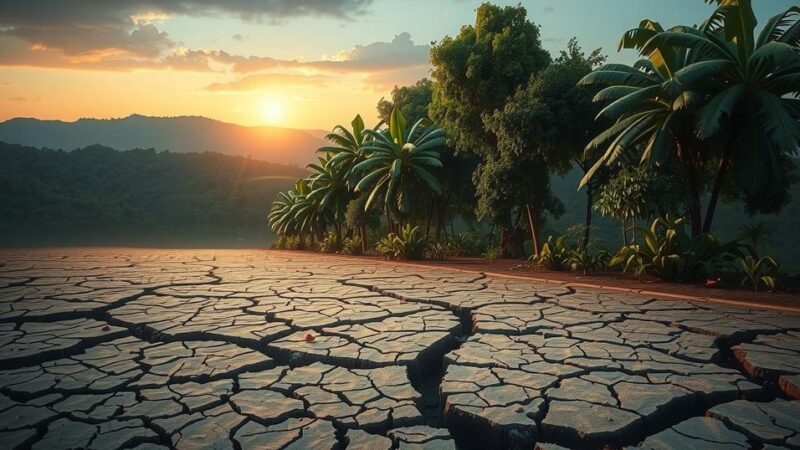The article highlights Bangladesh’s dire situation as a result of climate change, including predictions of significant loss of arable land and food insecurity. It critiques the inadequacies of the Bangladeshi government’s response and underscores the global disparity in climate impact, suggesting a climate apartheid where wealthier nations can mitigate risks at the expense of poorer nations like Bangladesh.
The persistent deluge, sudden flooding, and the plight of environmental migrants in Bangladesh have culminated in a national crisis that has been long anticipated by scientists. The World Risk Index 2023 identifies Bangladesh as the ninth most vulnerable nation facing climate disasters, predicting a staggering 30% reduction in arable land by the year 2050 due to elevating sea levels. The implications for rice production, a dietary staple, are alarming, coupled with a forecasted loss of 17% of the nation’s total land area. This predicament poses a dire threat to food security and could precipitate widespread famine. Furthermore, challenges such as unemployment, housing shortages, and rampant poverty are likely to intensify as a result of these environmental changes. While it is profoundly disheartening that Bangladesh produces less than 0.1% of global greenhouse gas emissions, the nation remains highly vulnerable to the repercussions of climate change, particularly due to the melting Himalayan glaciers which threaten to exacerbate its precarious river systems with excessive flooding. Despite the urgent need for a strategic response to these climatic adversities, the Bangladeshi government’s efforts to devise effective policies are markedly inadequate. The political tumult within Bangladesh contributes to the inattentiveness towards climate change policies, yet the culpability extends to the global stage where the Global North exhibits a blatant disregard for the disproportionate effects of climate change on marginalized populations in the Global South. This situation is emblematic of an emerging climate apartheid, wherein affluent nations are able to insulate themselves from the adverse effects of climate-related disasters due to their amassed wealth, historically acquired through the exploitation of the Global South. A salient example can be drawn from the circumstances surrounding Bangladesh and the Netherlands, both of which share similar geographic vulnerabilities as delta nations facing rising sea levels. However, the disparities in their respective infrastructures highlight a stark reality: one country is equipped to address these challenges, while the other languishes without adequate resources. Moreover, within Bangladesh’s own borders, climate apartheid manifests. For instance, during recent flooding events in affluent regions like Feni, rapid and ample aid was dispatched, contrasting sharply with the neglect of poorer areas such as Sherpur, where the response was minimal. The repercussions of the climate crisis will not be uniformly felt, and rather will be experienced grossly unevenly. The origins of the crisis trace back to the Industrial Revolution, spearheaded in Europe and North America, leading to significant economic advancements for these regions, while the Global South bears the brunt of this exploitation. Notably, an estimated 92% of greenhouse gas emissions over the past two centuries emanated from the Global North, which has now shifted the discourse to unjustly attribute the climate crisis blame to developing nations. Furthermore, while it is irrefutable that a reduction in emissions is imperative, there exists an equally pressing need for substantial support and resources for these developing countries, which have yet to materialize from their counterparts in the Global North. In conclusion, the climate crisis represents an existential threat to many communities, with estimates from the United Nations suggesting that between 2030 and 2050, every year 250,000 individuals may perish as a consequence. Therefore, it is not simply an environmental concern but a profound human rights issue that necessitates immediate and prioritized attention from the Bangladeshi government and the international community.
This article discusses the alarming impact of climate change on Bangladesh, specifically focusing on the predictions made by scientists regarding natural disasters, loss of arable land, and the broader implications for the nation’s food security and economy. The country is under severe threat from rising sea levels, despite being a minimal contributor to greenhouse gas emissions, and faces systemic neglect at both local and global scales. The notion of climate apartheid is explored, illustrating the deep disparities between wealthy nations and vulnerable countries, and the urgent need for equitable climate policies and support to mitigate the dire consequences of climate change.
The findings indicate that the climate crisis is not just an environmental challenge but a significant human rights concern. The disparity in vulnerability among nations, exacerbated by historical exploitation, underscores the necessity for immediate and robust action from both the Bangladeshi government and the international community to address these pressing issues.
Original Source: asianews.network






